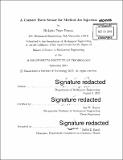A contact force sensor for medical jet injection
Author(s)
Demas, Nickolas Peter
DownloadFull printable version (21.81Mb)
Other Contributors
Massachusetts Institute of Technology. Department of Mechanical Engineering.
Advisor
Ian W. Hunter.
Terms of use
Metadata
Show full item recordAbstract
Medical jet injection, in which a narrow fluid drug stream is propelled into the skin without a needle, was first conceived in the 1940s [1]. However, a major drawback of most injectors is the lack of controllability of jet parameters. Recent work at the BioInstrumentation Laboratory at MIT has resulted in a tunable, high-performance linear Lorentz-force jet injector which allows for careful control of many injection variables. The sensor presented in this thesis further improves the ability to quantify and control contact forces between the injection nozzle and tissue. This sensor uses a three-spoke flexure system with full-bridge strain gauge assemblies mounted on each flexural arm to measure both normal and lateral forces applied to the nozzle. The design, fabrication, calibration, and validation for the sensor are detailed along with results for preliminary tissue injections into ex vivo porcine tissue. These preliminary tests showed higher percent volume delivery to the tissue with an elevated normal force. Under normal forces of 4 to 8 N, the BioInstrumentation Lab's jet injector achieved percent volume delivery of 89.1 ± 5.1%, whereas with normal forces of 0 to 4 N, the percent volume delivery was 68.9 ± 12.7%.
Description
Thesis: S.M., Massachusetts Institute of Technology, Department of Mechanical Engineering, 2015. Cataloged from PDF version of thesis. Includes bibliographical references (pages 131-135).
Date issued
2015Department
Massachusetts Institute of Technology. Department of Mechanical EngineeringPublisher
Massachusetts Institute of Technology
Keywords
Mechanical Engineering.